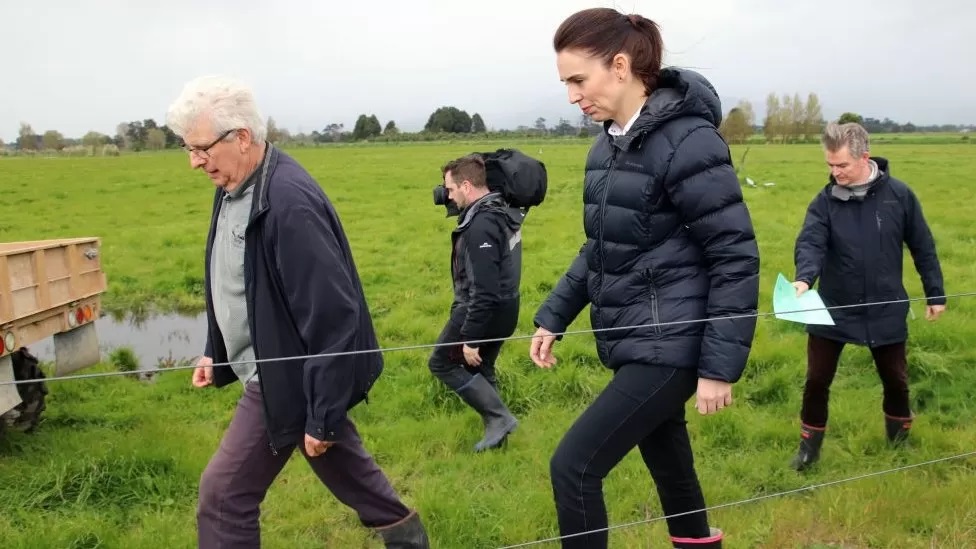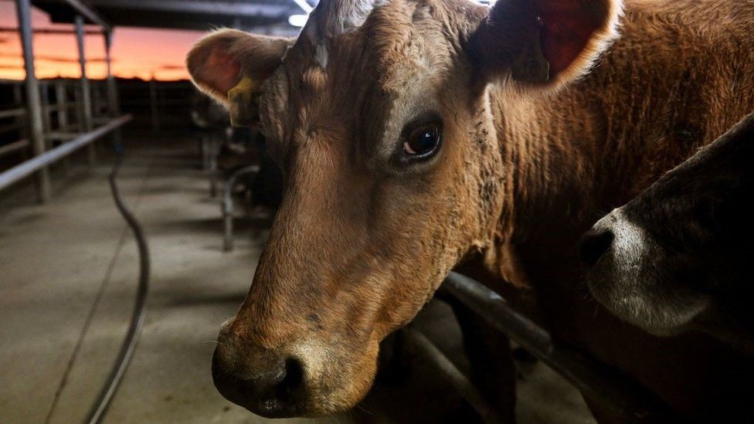New Zealand has proposed taxing the greenhouse gasses that farm animals produce from burping and urinating in a bid to tackle climate change.
The world-first scheme will see farmers paying for agricultural emissions in some form by 2025.
The country's farming industry accounts for about half of its emissions.
But farmers have been quick to criticise the plan, with one lobby group saying it would "rip the guts out of small-town New Zealand".
Prime Minister Jacinda Ardern said money raised from the proposed levy will be pumped back into the industry to finance new technologies, research and incentive payments for farmers.

"New Zealand's farmers are set to be the first in the world to reduce agricultural emissions, positioning our biggest export market for the competitive advantage that brings in a world increasingly discerning about the provenance of their food," she told reporters while announcing the proposals from a farm in Wairarapa.
The pricing has not yet been decided on, but the government says that farmers should be able to make up the cost of the levy by charging more for climate-friendly produce.
But some farmers have condemned the plans, saying they could prompt many of them to sell up.
Federated Farmers national president Andrew Hoggard said the plan will "rip the guts out of small-town New Zealand", leading to farms making way for trees.
He added that the body was "deeply unimpressed" with the government's interactions with farmers while examining alternative proposals.
Farmers will now be selling their land "so fast you won't even hear the dogs barking on the back of the ute (pickup truck) as they drive off", he added.
Some have also argued that the plans could actually increase emissions if food production was to move to countries with less efficient farming methods.
In 2019, methane in the atmosphere reached record levels, around two-and-a-half times above what they were in the pre-industrial era.
Latest Stories
-
Kotoko to decide Karim Zito’s future at end of season – Sarfo Duku
2 minutes -
‘The law is the law; and it’s being applied to her’ – Spio-Garbrah on suspended CJ’s removal saga
13 minutes -
Oaks FC secure Women’s Premier League promotion with a game to spare
15 minutes -
The Chief Justice is undergoing a constitutional process – Hamza Suhuyini
32 minutes -
Kojo PJay wins Comic Writer of the Year at 2025 Ghana Comedy Awards
44 minutes -
Ghana’s tax system encourages evasion, enriches just a few – Prof. Quartey warns
47 minutes -
2025 Unity Cup: Otto Addo expects ‘tough battle’ against Nigeria
50 minutes -
Academic integrity under threat: The rise of exam scams
1 hour -
‘He didn’t get the recognition he deserved’ – Mikel Obi on Essien
2 hours -
Kumasi: Fire destroys several residential apartments at Bomso
2 hours -
Today’s front pages: Wednesday, May 28, 2025
2 hours -
Hilda Aku Asiedu: Ghana’s carbon credit pension proposal
2 hours -
Cedi to continue holding firm against dollar; one dollar going for GH¢11.80
3 hours -
Dietary Management of Polycystic Ovary Syndrome: A Ghanaian Perspective
3 hours -
Orca Deco deepens commitment to Ghanaians with enhanced ‘Stronger cedi, lower prices’ initiative; earns presidential acclaim
3 hours

